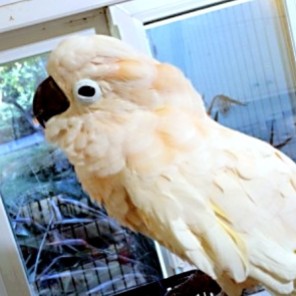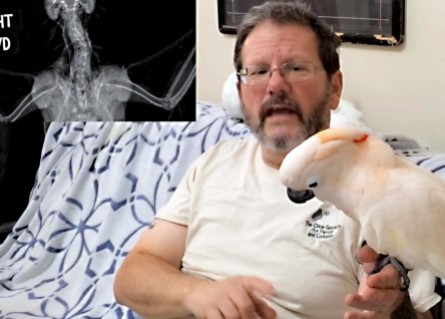Don Scott (FB), Founder and Executive Director of Chloe Sanctuary (IG) in Fallbrook, California, just outside San Diego, is first to voice his compassion for those who fail with parrots or cockatoos and hand them off to a sanctuary or rescue: “Often I see eyes darkened by futility. They have given up. They have reached the point they would rather die than continue living. Life has become a living hell where the one they wanted to love has become a demon. Because of that demon, they have become raving, screaming creatures, that would do anything to make the pain stop. There is nowhere to turn. They live in a nightmare world. This is how most people come to us.”
Don introduces Peaches, a special needs Moluccan cockatoo, in the first of Chloe Sanctuary’s Cockatude videos. Don’s work doesn’t stop with rescue, rehabilitation, training and maintenance. Chloe Sanctuary, also is on a mission to educate the public about large birds. Three years ago, Chloe Sanctuary started Cockatude, a YouTube channel of educational videos starring their now rehabilitated and trained sanctuary birds, Don and the sanctuary’s vets. Cockatude benefits both community and birds, but it also rounds out a great nonprofit model: the public version of each video is free. However, a sponsor, for the cost of a Starbuck’s coffee per month, gains access to fuller, private editions of each video.
Peaches arrived at Chloe Sanctuary with Feather Destructive Behavior, (FDB), a neck mobility problem, and underweight. Like the other needy birds at Chloe Sanctuary, Peaches special care regimen is necessary for the length of her life. Of course, as a young bird, she will outlive Don probably by sixty years. Any volunteers stepping up yet?
Peaches is high-maintenance. Charming when she imitates a fire alarm, she needed training and not to do so excessively. The vet treated Peach’s FDB with small amounts of Haldol. Having FDB for more than one year prior to arriving at the sanctuary, Peaches likely requires lifelong medication management to prevent relapse. (See Cockatude Episode 14: Feather Destructive Behavior).
In addition, six of Chloe’s 27 vertebrae — all neck vertebrae, are fused, seriously impacting her self-cate. In fact, Peaches had only destroyed chest feathers because she lacked the mobility to destroy feathers elsewhere on her body. The fused vertebrae appear on the x-ray akin to a sway back.
Because Peaches can’t rotate her neck, she cannot preen. Enter Don the Mate: he must preen her tail feathers to prevent such things as follicle infection. Of course, normally, you do not want to stroke a bird along its back or under its wings because that triggers hormones and mating behavior — and creates frustration and misunderstanding in the parront-fid relationship. But Don has no choice; Don preens Peaches, and she considers him her mate (thank goodness he is not married!)
Don works eighteen hours per day, 365 days per year. With birds like Peaches, with their time-consuming, demanding care regimens (and cockatoos and large parrots require high levels of human interaction and attention to begin with), Don is a committed sanctuary keeper. Always, financial support to maintain a staff is appreciated, as these birds do require intensive attention. In fact, if more funds become available, Don would like to resume the training/adoption programs, with adequate staff to train and vet.
Don confides he was unprepared for his first cockatoo rescue. Having owned two parrots in the 1970s, in the early 2000s Don found himself buried knee-deep in Parrots for Dummies, “nowhere near ready in my own mind to live with one of these complicated creatures.” But then he saw the posting for cockatoo Chloe: living but an hour away, Chloe’s parronts posted on a Friday that they would get “rid of the bird one way or another” that weekend.
You know how the next chapter goes: Don drove off immediately to save Chloe.
While Chloe’s feathers below the neck had severe damage from feather destructive behavior (FDB), she seemed a “joyful kind of bird.” Not knowing the signs well enough, Don watched as Chloe’s FDB worsened: unanticipated divorce stress in his own life meant he didn’t interact with her as much as she needed. Don compares FDB to “humans who attempt suicide and then call 911 for help.” As birds suffer mentally and emotionally, they pick at their feathers. They shortly learn that the induced pain actually releases endorphins, briefly alleviating the mental pain. “Pain leads to pleasure: a vicious cycle.”
Over the years, alongside Chloe Sanctuary’s vets, Don has managed many cases of FDB in many large birds, frequently with the help of small, measured doses of Haldol (halperodol), judiciously administered. In fact, the vet reports a 90% success rate on Haldol alone, while sometimes additional drugs such are added. For instance, some breeds do not respond as well to Haldol unless Xanax (alprazolam) is also given. The vet sees Haldol’s advantage in its easiness to administer, the length of the dosing, and how it can be coordinated with the bird’s social schedule.
The Cockatude video on FDB below shares invaluable instruction and experience on the nature, treatment and management of Feather Destructive Behavior:
http://www.youtube.com/TfOCjf6YgV8
Ruing his own mistakes with Chloe, Don sought out “a community of people who were rescuing, rehabilitating and re-homing” large birds, but his county had none. Don responded to the unmet need. Don enrolled in Susan Friedman’s Applied Behavior Analysis course targeting parrot behavior — “the wisest money I ever spent” as well as courses on non-profits. Within the year (2007), Chloe Sanctuary gained its official California and U.S. tax-exempt charitable organization status.
The birds at Chloe Sanctuary live in a well-designed but enclosed environment: the birds each have a day cage, a night cage, a socialization room and, a shared outdoor aviary. Don notes that captive-bred birds are “autistic” in comparison to wild birds, lacking good navigation and quick reflexes. Don advises aviary use is critical to birds’ well-being, but should always be supervised. Careful aviary is critical to birds’ protection and enjoyment. The birds themselves need flight training to be safe as well.
Like many avian experts, Don uses a training model based on operant conditioning. Applied Behavior Analysis teaches the parrot to make choices that benefit both parront and fid. “My certification in ABA hangs in my office. It is a reminder that everyone has a right to make their own choices and that we are here to help them learn to make the best ones.”
We congratulate Chloe Sanctuary on their tenth anniversary and hope you will make use of Cockatude educational videos and support the valuable work Don does with sponsorship.










